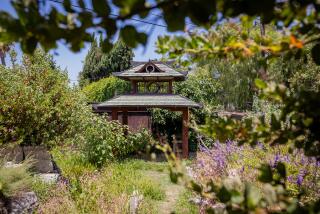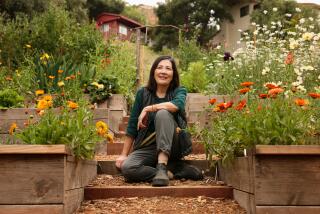Thrifty Gardening Couple Cultivated $750,000
- Share via
Lester and Wilma Harrell worked in the gardens of the wealthy and lived like shadows in the night. They were shy, frugal and plain--on the surface totally unremarkable.
But now that they’re dead, this very private and childless couple are making people sit up and take notice.
The Harrells--wage earners all their lives who built their one-bedroom home in Baldwin Park and shopped sparingly at thrift stores--amassed a fortune of perhaps $750,000 from their decades of hoeing, trimming and planting.
More surprising perhaps, most of the Harrells’ money--about $590,000--has been bequeathed to San Marino’s Huntington Library, an old California estate now famed for its gardens as well as its art and rare books.
The bequest was announced following a stroke and the subsequent death at age 80 of Wilma Harrell last month. Her husband died of heart disease in 1981 at age 76.
Appropriately, income from the gift--now set aside in an endowment in the Harrells’ name--will help pay for expansion and upkeep of the library’s rose garden where Lester Harrell worked for many years as a volunteer.
While they were alive, few suspected that the Harrells, who habitually dressed in work clothes, were salting away thousands in savings accounts and investing in blue-chip stocks.
One of those few was Thomas Pike, a retired oilman, former assistant secretary of defense in the Eisenhower Administration and former vice chairman of the Fluor Corp. The Harrells were employed for 40 years by Pike and his wife, Katherine. Moreover, the Pikes and the Harrells became close friends.
In an interview, Pike said that 20 years ago Lester Harrell showed him the list of stocks he had been investing in with the help of a stockbroker.
“Les didn’t know a thing about stocks,” Pike said. “He was like a little boy taking a good report card home to Pop. He knew I was something of a capitalist or something. I was absolutely amazed. I think there might have been $75,000 there. I just couldn’t imagine these people I’d never known in any other clothes but overalls--they were clean, but they were always work clothes--would be doing something like that. They were truly your horny-handed sons of toil. . . . It was extraordinary, even in retrospect, it is absolutely extraordinary.”
Katherine Pike believes that the Harrells accumulated their small fortune because their backgrounds had conditioned them to an ethic of thrift and hard work. Lester arrived in Los Angeles from a hard-scrabble Texas farm, while Wilma was the daughter of a Vermont family of modest means, she said. Moreover, Wilma’s mother suffered a long bout with cancer, which must have drained the family’s resources, she added.
“Wilma thought anybody who paid more than 50 cents for a shirt was just a spendthrift,” she recalled. “They didn’t spend one nickel they didn’t have to spend. . . In some ways, they were superior in their attitudes. They felt that people squandered money, and they looked down on them.”
They Weren’t Penny Pinchers
However, the Harrells weren’t simple penny pinchers, Katherine Pike said, noting that they weren’t “masochistic or sadistic about the way they lived.” She added: “When they bought a truck, it was the best truck on the market, and it was in just absolutely perfect condition all the time.”
Moreover, Wilma Harrell collected first editions of Jack London’s and Zane Grey’s novels and both were fascinated by the Indians of the Southwest, Katherine Pike said.
When he went to the hospital a few days before his death, Lester Harrell was carrying $750 in cash, a fact that earned Wilma a chiding from a hospital administrator, who didn’t believe in carrying hefty sums, Katherine Pike said.
As she remembers it, Wilma Harrell “drew herself up in the chair and said: ‘When my husband came to Los Angeles, he had $40, and it made him comfortable to carry enough money to buy whatever he needed for the gardening and for our house.’ ”
By all accounts, Lester Harrell was an expert on roses and was frequently called on to judge the green-thumb efforts of others. He was a longtime member of the American Rose Society and received awards in 1964 and 1971 from the Pacific Southwest District of the society. He also received a posthumous award from the Huntington Library for his volunteer work.
A Perfectionist
Lester Harrell was a perfectionist in everything he did, Katherine Pike recalled, noting that his wife seldom forgot that fact.
“After Lester died, Wilma would be doing something in the garden and she’d look up and say: ‘I just know Lester’s looking at me and telling me I’m not doing it right.’ ”
Despite their different stations in life, the Pikes and the Harrells were warm friends and the Pikes speak of them with affection and a sense of loss.
“They were talented and we miss them a lot,” Katherine Pike said. Her husband commented, “They were solid gold. You always knew where you stood with them.”
With some pride, he concluded: “It’s the kind of story that can only happen in the U.S.A., the land of the free and the home of the brave. Anybody who tells you there ain’t no opportunity for anybody anymore is just wrong.”






